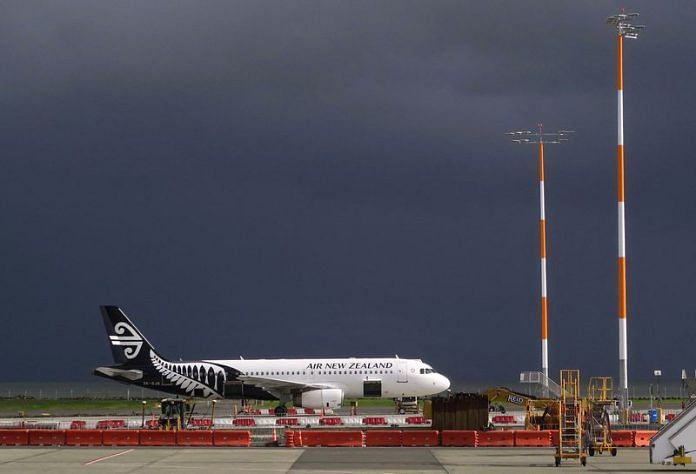(Reuters) -Air New Zealand abandoned on Tuesday a 2030 emissions reduction target, citing delivery delays of fuel-efficient aircraft and high green fuel prices, in a move signalling the difficulty aviation is having meeting de-carbonisation goals. This is the first major airline to row back on climate aspirations but the carrier said it was committed to an industry-wide target of net zero emissions by 2050 and was working on a new near-term goal. Aviation is deemed responsible for about 2% of the world’s emissions but is considered one of the hardest sectors to decarbonise as fuel for flights cannot be easily replaced with other kinds of power.
“Many of the levers needed to meet the target, including the availability of new aircraft, the affordability and availability of alternative jet fuels, and global and domestic regulatory and policy support, are outside the airline’s direct control and remain challenging,” New Zealand’s flag carrier said in a statement. Airlines are banking on plant-based Sustainable Aviation Fuels (SAF) and more efficient aircraft to reduce emissions in the near-term, but SAF production is expensive and challenging to ramp-up, and plane manufacturers are struggling to deliver new-generation aircraft on time.
Many environmental advocates say aviation industry growth is fundamentally incompatible with sustainability.
Air New Zealand in 2022 said it wanted to reduce carbon intensity 28.9% by 2030 compared with 2019 levels, in a methodology validated by the Science-based Targets initiative (SBTi), a U.N.-backed corporate climate action group.
The target went further than a 2023 agreement by the global aviation industry to lower carbon emissions by 5% by 2030.
FLEET
Air New Zealand has Boeing 787 Dreamliner and Airbus A320neo planes on order.
CEO Greg Foran said it had become apparent in recent weeks that delivery delays risked the 2030 goal and the airline would withdraw from the SBTi network immediately.
“It is possible the airline may need to retain its existing fleet for longer than planned,” Foran said.
Air New Zealand in February also said five of its “newest and most-efficient” A321neo aircraft will be out of service at any one time within the next 18 months, due to maintenance on their Pratt & Whitney engines – an issue affecting airlines globally.
Climate has been a significant part of Air New Zealand’s corporate messaging.
It has ordered an all-electric five-seat plane and wants to conduct a demonstration flight by 2026.
The airline last year described the 2030 target as aspirational and challenging, with some factors out of its control.
New Zealand’s conservative government has set about rolling back several environmental policies since it was elected last October including removing agriculture from the emissions trading scheme and reducing incentives for companies that want to go green.
A draft emissions plan released last week shows that in part due to these policy changes the country could miss its 2035 emissions and net zero by 2050 targets.
University of Otago Climate Change Research Network co-director Professor Sara Walton said the need for industry leaders in the climate and emissions space is more important than ever.
“While it is understandable that the intensity targets are going to be difficult to meet when there is little incentive being provided and a lack of supportive policies and regulations, (Air New Zealand’s) move away from the SBTi is quite concerning,” she told Reuters.
Lufthansa last month said it was adding an environmental charge to its fares to cover the cost of new EU rules on reducing emissions, amid warnings from airlines that SAF mandates would drive up costs.
(Reporting by Roshan Thomas in Bengaluru, Lisa Barrington in Seoul and Lucy Cramer in New Zealand; Editing by Sriraj Kalluvila and Jacqueline Wong)
Disclaimer: This report is auto generated from the Reuters news service. ThePrint holds no responsibilty for its content.



